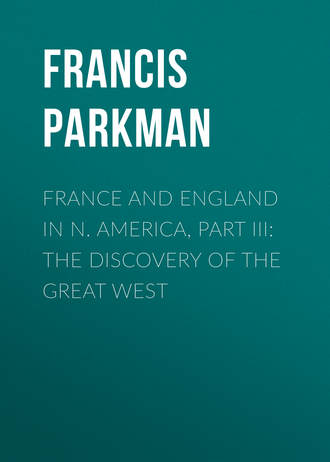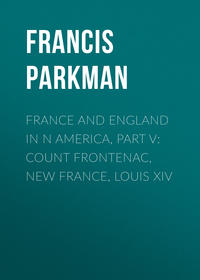 полная версия
полная версияFrance and England in N. America, Part III: The Discovery of the Great West
"In the name of the Most High, Mighty, and Redoubted Monarch, Louis, Fourteenth of that name, Most Christian King of France and of Navarre, I take possession of this place, Sainte Marie du Saut, as also of Lakes Huron and Superior, the Island of Manatoulin, and all countries, rivers, lakes, and streams contiguous and adjacent thereunto; both those which have been discovered and those which may be discovered hereafter, in all their length and breadth, bounded on the one side by the seas of the North and of the West, and on the other by the South Sea: declaring to the nations thereof that from this time forth they are vassals of his Majesty, bound to obey his laws and follow his customs: promising them on his part all succor and protection against the incursions and invasions of their enemies: declaring to all other potentates, princes, sovereigns, states and republics,—to them and their subjects,—that they cannot and are not to seize or settle upon any parts of the aforesaid countries, save only under the good pleasure of His Most Christian Majesty, and of him who will govern in his behalf; and this on pain of incurring his resentment and the efforts of his arms. Vive le Roi." [Footnote: Procès Verbal de la Prise de Possession.]
The Frenchmen fired their guns and shouted "Vive le Roi," and the yelps of the astonished Indians mingled with the din.
What now remains of the sovereignty thus pompously proclaimed? Now and then, the accents of France on the lips of some straggling boatman or vagabond half-breed;—this, and nothing more.
When the uproar was over, Father Allouez addressed the Indians in a solemn harangue; and these were his words: "It is a good work, my brothers, an important work, a great work, that brings us together in council to-day. Look up at the cross which rises so high above your heads. It was there that Jesus Christ, the Son of God, after making himself a man for the love of men, was nailed and died, to satisfy his Eternal Father for our sins. He is the master of our lives; the ruler of Heaven, Earth, and Hell. It is he of whom I am continually speaking to you, and whose name and word I have borne through all your country. But look at this post to which are fixed the arms of the great chief of France, whom we call King. He lives across the sea. He is the chief of the greatest chiefs, and has no equal on earth. All the chiefs whom you have ever seen are but children beside him. He is like a great tree, and they are but the little herbs that one walks over and tramples under foot. You know Onontio, [Footnote: The Indian name of the Governor of Canada.] that famous chief at Quebec; you know and you have seen that he is the terror of the Iroquois, and that his very name makes them tremble, since he has laid their country waste and burned their towns with fire. Across the sea there are ten thousand Onontios like him, who are but the warriors of our great King, of whom I have told you. When he says, 'I am going to war,' everybody obeys his orders; and each of these ten thousand chiefs raises a troop of a hundred warriors, some on sea and some on land. Some embark in great ships, such as you have seen at Quebec. Your canoes carry only four or five men, or at the most, ten or twelve; but our ships carry four or five hundred, and sometimes a thousand. Others go to war by land, and in such numbers that if they stood in a double file they would reach from here to Mississaquenk, which is more than twenty leagues off. When our King attacks his enemies, he is more terrible than the thunder: the earth trembles; the air and the sea are all on fire with the blaze of his cannon: he is seen in the midst of his warriors, covered over with the blood of his enemies, whom he kills in such numbers, that he does not reckon them by the scalps, but by the streams of blood which he causes to flow. He takes so many prisoners that he holds them in no account, but lets them go where they will, to show that he is not afraid of them. But now nobody dares make war on him. All the nations beyond the sea have submitted to him and begged humbly for peace. Men come from every quarter of the earth to listen to him and admire him. All that is done in the world is decided by him alone.
"But what shall I say of his riches? You think yourselves rich when you have ten or twelve sacks of corn, a few hatchets, beads, kettles, and other things of that sort. He has cities of his own, more than there are of men in all this country for five hundred leagues around. In each city there are store-houses where there are hatchets enough to cut down, all your forests, kettles enough to cook all your moose, and beads enough to fill all your lodges. His house is longer than from here to the top of the Saut,—that is to say, more than half a league,—and higher than your tallest trees; and it holds more families than the largest of your towns." [Footnote: A close translation of Dablon's report of the speech. See Relation, 1671, 27.] The Father added more in a similar strain; but the peroration of his harangue is not on record.
Whatever impression this curious effort of Jesuit rhetoric may have produced upon the hearers, it did not prevent them from stripping the royal arms from the post to which they were nailed, as soon as St. Lusson and his men had left the Saut; probably, not because they understood the import of the symbol, but because they feared it as a charm. St. Lusson proceeded to Lake Superior; where, however, he accomplished nothing, except, perhaps, a traffic with the Indians on his own account; and he soon after returned to Quebec. Talon was resolved to find the Mississippi, the most interesting object of search, and seemingly the most attainable, in the wild and vague domain which he had just claimed for the king. The Indians had described it; the Jesuits were eager to discover it; and La Salle, if he had not reached it, had explored two several avenues by which it might be approached. Talon looked about him for a fit agent of the enterprise, and made choice of Louis Joliet, who had returned from Lake Superior. [Footnote: Lettre de Frontenac au Ministre, 2 Nov. 1672, MS. In the Brodhead Collection, by a copyist's error, the name of the Chevalier de Grandfontaine is substituted for that of Talon.] But the Intendant was not to see the fulfilment of his design. His busy and useful career in Canada was drawing to an end. A misunderstanding had arisen between him and the Governor, Courcelles. Both were able and public- spirited; but the relations between the two chiefs of the colony were of a nature necessarily so critical, that a conflict of authority was scarcely to be avoided. The Governor presided at the council, and held the military command; the Intendant directed affairs of justice, finance, and commerce. Each thought his functions encroached upon, and both asked for recall. [Footnote: Courcelles returned home on the plea of ill health. Talon remained a little longer; but soon asked leave to return to France, seeing that he should fare worse with the new governor than with the old.] Another governor succeeded; one who was to stamp his mark, broad, bold, and ineffaceable, on the most memorable page of French-American History.
In the Church of Notre Dame, at Quebec, on a day in the early autumn of 1672, the priests were singing Te Deum for the safe arrival of him whom they were soon to wish beyond the sea again, or beneath it. Here you would have seen the new governor surrounded by officers, and by the chief inhabitants, anxious to pay their court; a tall man in the pompous garb of a military noble of that gorgeous reign, well advanced in middle life, but whose high keen features, full of intellect and fire, bespoke his prompt undaunted nature,—Louis de Buade, Count of Palluau and Frontenac. He belonged to the high nobility, had held important commands, and, if the song-writers of his time speak true, had anticipated the king in the favors of Madame de Montespan. [Footnote: See Brunet, in notes to Correspondance de la Duchesse d'Orléans; Paulin, in notes to the Historiettes de Tallement des Reaux; and Margry, in Journal Général de I'Instruction Publique.] His wife, who could not endure him—and the aversion seems to have been mutual—was a noted beauty of the court, and held great influence in its brilliant and corrupt society. [Footnote: St. Simon and Mademoiselle de Montpensier give very curious accounts of Madame de Frontenac, who is also mentioned in the Lettres de Madame de Sevigné. Her portrait will be found at Versailles.] Frontenac was full of faults; but it is not through these that his memory has survived him. He was domineering, arbitrary, intolerant of opposition, irascible, vehement in prejudice, often wayward, perverse, and jealous: a persecutor of those who crossed him; yet capable, by fits, of moderation, and a magnanimous lenity; and gifted with a rare charm—not always exerted—to win the attachment of men: versed in books, polished in courts and salons; without fear, incapable of repose, keen and broad of sight, clear in judgment, prompt in decision, fruitful in resources, unshaken when others despaired; a sure breeder of storms in time of peace, but in time of calamity and danger a tower of strength. His early career in America was beset with ire and enmity; but admiration and gratitude hailed him at its close: for it was he who saved the colony and led it triumphant from an abyss of ruin. [Footnote: In the Library of the Seminary of Quebec is preserved the funeral oration pronounced over the body of Frontenac by Olivier Goyer, a Récollet friar. It is a blind and wholesale panegyric, but it is interlined with notes and comments at great length, by some other ecclesiastic, a bitter enemy of the Governor. He is vindictive and acrimonious beyond measure; but, between the two, a good deal of truth is struck out. Charlevoix's estimate of Frontenac is admirably candid, when it is remembered that he writes of an enemy of his Order. The career of Frontenac, his letters, and those of his enemies,—of which many are preserved,—are, however, his best interpretation.]
CHAPTER V. 1672-1675. THE DISCOVERY OF THE MISSISSIPPI
JOLIET SENT TO FIND THE MISSISSIPPI.—JACQUES MARQUETTE.—DEPARTURE.– GREEN BAY.—THE WISCONSIN.—THE MISSISSIPPI.—INDIANS.—MANITOUS.– THE ARKANSAS.—THE ILLINOIS.—JOLIET'S MISFORTUNE.—MARQUETTE AT CHICAGO.—HIS ILLNESS.—HIS DEATH.
If Talon had remained in the colony, Frontenac would infallibly have quarrelled with him; but he was too clear-sighted not to approve his plans for the discovery and occupation of the interior. Before sailing for France, Talon recommended Joliet as a suitable agent for the discovery of the Mississippi, and the Governor accepted his counsel. [Footnote: Lettre de Frontenac au Ministre, 2 Nov. 1672; Ibid 14 Nov. 1674. MSS]
Louis Joliet was the son of a wagon-maker in the service of the Company of the Hundred Associates, [Footnote: See "Jesuits in North America."] then, owners of Canada. He was born at Quebec in 1645, was educated by the Jesuits; and, when still very young, he resolved to be a priest. He received the tonsure and the minor orders at the age of seventeen. Four years after, he is mentioned with especial honor for the part he bore in the disputes in philosophy, at which the dignitaries of the colony were present, and in which the Intendant himself took part. [Footnote: "Le 2 Juillet (1666) les premières disputes de philosophie se font dans la congrégation avec succès. Toutes les puissances s'y trouvent; M. l'Intendant entr'autres y a argumenté très-bien. M. Jolliet et Pierre Francheville y ont très-bien répondu de toute la logique."—Journal des Jésuites, MS.] Not long after, he renounced his clerical vocation, and turned fur-trader. Talon sent him, with one Péré, to explore the copper- mines of Lake Superior; and it was on his return from this expedition that he met La Salle and the Sulpitians near the head of Lake Ontario. [Footnote: Nothing was known of Joliet till Shea investigated his history. Ferland, in his Notes sur les Registres de Notre-Dame de Québec; Faillon, in his Colonie Française en Canada; and Margry, in a series of papers in the Journal Général de I'Instruction Publique,—have thrown much new light on his life. From journals of a voyage made by him at a later period to the coast of Labrador,—given in substance by Margry,—he seems to have been a man of close and intelligent observation. His mathematical acquirements appear to have been very considerable.]
In what we know of Joliet, there is nothing that reveals any salient or distinctive trait of character, any especial breadth of view or boldness of design. He appears to have been simply a merchant, intelligent, well educated, courageous, hardy, and enterprising. Though he had renounced the priesthood, he retained his partiality for the Jesuits; and it is more than probable that their influence had aided not a little to determine Talon's choice. One of their number, Jacques Marquette, was chosen to accompany him.
He passed up the lakes to Michillimackinac; and found his destined companion at Point St. Ignace, on the north side of the strait; where, in his palisaded mission-house and chapel, he had labored for two years past to instruct the Huron refugees from St. Esprit, and a band of Ottawas who had joined them. Marquette was born in 1637, of an old and honorable family at Laon, in the north of France, and was now thirty-five years of age. When about seventeen, he had joined the Jesuits, evidently from motives purely religious; and in 1666 he was sent to the missions of Canada. At first he was destined to the station of Tadoussac; and, to prepare himself for it, he studied the Montagnais language under Gabriel Druilletes. But his destination was changed, and he was sent to the Upper Lakes in 1668, where he had since remained. His talents as a linguist must have been great; for, within a few years, he learned to speak with ease six Indian languages. The traits of his character are unmistakable. He was of the brotherhood of the early Canadian missionaries, and the true counterpart of Garnier or Jogues. He was a devout votary of the Virgin Mary; who, imaged to his mind in shapes of the most transcendent loveliness with which the pencil of human genius has ever informed the canvas, was to him the object of an adoration not unmingled with a sentiment of chivalrous devotion. The longings of a sensitive heart, divorced from earth, sought solace in the skies. A subtile element of romance was blended with the fervor of his worship, and hung like an illumined cloud over the harsh and hard realities of his daily lot. Kindled by the smile of his celestial mistress, his gentle and noble nature knew no fear. For her he burned to dare and to suffer, discover new lands and conquer new realms to her sway.
He begins the journal of his voyage thus: "The day of the Immaculate Conception of the Holy Virgin; whom I had continually invoked, since I came to this country of the Ottawas, to obtain from God the favor of being enabled to visit the nations on the river Mississippi—this very day was precisely that on which M. Joliet arrived with orders from Count Frontenac, our Governor, and from M. Talon, our Intendant, to go with me on this discovery. I was all the more delighted at this good news, because I saw my plans about to be accomplished, and found myself in the happy necessity of exposing my life for the salvation of all these tribes; and especially of the Illinois, who, when I was at Point St. Esprit, had begged me very earnestly to bring the word of God among them."
The outfit of the travellers was very simple. They provided themselves with two birch canoes, and a supply of smoked meat and Indian corn; embarked with five men; and began their voyage on the seventeenth of May. They had obtained all possible information from the Indians, and had made, by means of it, a species of map of their intended route. "Above all," writes Marquette, "I placed our voyage under the protection of the Holy Virgin Immaculate, promising that if she granted us the favor of discovering the great river, I would give it the name of the Conception." [Footnote: The doctrine of the Immaculate Conception, sanctioned in our own time by the Pope, was always a favorite tenet of the Jesuits; and Marquette was especially devoted to it.] Their course was westward; and, plying their paddles, they passed the Straits of Michillimackinac, and coasted the northern shores of Lake Michigan; landing at evening to build their camp-fire at the edge of the forest, and draw up their canoes on the strand. They soon reached the river Menomonie, and ascended it to the village of the Menomonies, or Wild-rice Indians. [Footnote: The Malhoumines, Malouminek, Oumalouminek, or Nation des Folles-Avoines, of early French writers. The folle-avoine, wild oats or "wild rice,"– Zizania aquatica,—was their ordinary food, as also of other tribes of this region.] When they told them the object of their voyage, they were filled with astonishment, and used their best ingenuity to dissuade them. The banks of the Mississippi, they said, were inhabited by ferocious tribes, who put every stranger to death, tomahawking all new-comers without cause or provocation. They added that there was a demon in a certain part of the river, whose roar could be heard at a great distance, and who would engulf them in the abyss where he dwelt; that its waters were full of frightful monsters, who would devour them and their canoe; and, finally, that the heat was so great that they would perish inevitably. Marquette set their counsel at naught, gave them a few words of instruction in the mysteries of the Faith, taught them a prayer, and bade them farewell.
The travellers soon reached the mission at the head of Green Bay; entered the Fox River; with difficulty and labor dragged their canoes up the long and tumultuous rapids; crossed Lake Winnebago; and followed the quiet windings of the river beyond, where they glided through an endless growth of wild rice, and scared the innumerable birds that fed upon it. On either hand rolled the prairie, dotted with groves and trees, browsing elk and deer. [Footnote: Dablon, on his journey with Allouez in 1670, was delighted with the aspect of the country and the abundance of game along this river. Carver, a century later, speaks to the same effect,—saying the birds rose up in clouds from the wild-rice marshes.] On the seventh of June, they reached the Mascoutins and Miamis, who, since the visit of Dablon and Allouez, had been joined by the Kickapoos. Marquette, who had an eye for natural beauty, was delighted with the situation of the town, which he describes as standing on the crown of a hill; while, all around, the prairie stretched beyond the sight, interspersed with groves and belts of tall forest. But he was still more delighted when he saw a cross planted in the midst of the place. The Indians had decorated it with a number of dressed deer-skins, red girdles, and bows and arrows, which they had hung upon it as an offering to the Great Manitou of the French,—a sight by which, as Marquette says, he was "extremely consoled."
The travellers had no sooner reached the town than they called the chiefs and elders to a council. Joliet told them that the Governor of Canada had sent him to discover new countries, and that God had sent his companion to teach the true faith to the inhabitants; and he prayed for guides to show them the way to the waters of the Wisconsin. The council readily consented; and on the tenth of June the Frenchmen embarked again, with two Indians to conduct them. All the town came down to the shore to see their departure. Here were the Miamis, with long locks of hair dangling over each ear, after a fashion which Marquette thought very becoming; and here, too, the Mascoutins and the Kickapoos, whom he describes as mere boors in comparison with their Miami townsmen. All stared alike at the seven adventurers, marvelling that men could be found to risk an enterprise so hazardous.
The river twisted among lakes and marshes choked with wild rice; and, but for their guides, they could scarcely have followed the perplexed and narrow channel. It brought them at last to the portage; where, after carrying their canoes a mile and a half over the prairie and through the marsh, they launched them on the Wisconsin, bade farewell to the waters that flowed to the St. Lawrence, and committed themselves to the current that was to bear them they knew not whither,—perhaps to the Gulf of Mexico, perhaps to the South Sea or the Gulf of California. They glided calmly down the tranquil stream, by islands choked with trees and matted with entangling grape-vines; by forests, groves, and prairies,—the parks and pleasure-grounds of a prodigal nature; by thickets and marshes and broad bare sand-bars; under the shadowing trees, between whose tops looked down from afar the bold brow of some woody bluff. At night, the bivouac,– the canoes inverted on the bank, the flickering fire, the meal of bison- flesh or venison, the evening pipes, and slumber beneath the stars: and when in the morning they embarked again, the mist hung on the river like a bridal veil; then melted before the sun, till the glassy water and the languid woods basked breathless in the sultry glare. [Footnote: The above traits of the scenery of the Wisconsin are taken from personal observation of the river during midsummer.]
On the 17th of June, they saw on their right the broad meadows, bounded in the distance by rugged hills, where now stand the town and fort of Prairie du Chien. Before them, a wide and rapid current coursed athwart their way, by the foot of lofty heights wrapped thick in forests. They had found what they sought, and "with a joy," writes Marquette, "which I cannot express," they steered forth their canoes on the eddies of the Mississippi.
Turning southward, they paddled down the stream, through a solitude unrelieved by the faintest trace of man. A large fish, apparently one of the huge cat-fish of the Mississippi, blundered against Marquette's canoe with a force which seems to have startled him; and once, as they drew in their net, they caught a "spade-fish," whose eccentric appearance greatly astonished them. At length, the buffalo began to appear, grazing in herds on the great prairies which then bordered the river; and Marquette describes the fierce and stupid look of the old bulls, as they stared at the intruders through the tangled mane which nearly blinded them.
They advanced with extreme caution, landed at night, and made a fire to cook their evening meal; then extinguished it, embarked again, paddled some way farther, and anchored in the stream, keeping a man on the watch till morning. They had journeyed more than a fortnight without meeting a human being; when, on the 25th, they discovered footprints of men in the mud of the western bank, and a well-trodden path that led to the adjacent prairie. Joliet and Marquette resolved to follow it; and, leaving the canoes in charge of their men, they set out on their hazardous adventure. The day was fair, and they walked two leagues in silence, following the path through the forest and across the sunny prairie, till they discovered an Indian village on the banks of a river, and two others on a hill half a league distant. [Footnote: The Indian villages, under the names of Peouaria (Peoria) and Moingouena, are represented in Marquette's map upon a river corresponding in position with the Des Moines; though the distance from the Wisconsin, as given by him, would indicate a river farther north.] Now, with beating hearts, they invoked the aid of Heaven, and, again advancing, came so near without being seen, that they could hear the voices of the Indians among the wigwams. Then they stood forth in full view, and shouted, to attract attention. There was great commotion in the village. The inmates swarmed out of their huts, and four of their chief men presently came forward to meet the strangers, advancing very deliberately, and holding up toward the sun two calumets, or peace-pipes, decorated with feathers. They stopped abruptly before the two Frenchmen, and stood gazing at them with attention, without speaking a word. Marquette was much relieved on seeing that they wore French cloth, whence he judged that they must be friends and allies. He broke the silence, and asked them who they were; whereupon they answered that they were Illinois, and offered the pipe; which having been duly smoked, they all went together to the village. Here the chief received the travellers after a singular fashion, meant to do them honor. He stood stark naked at the door of a large wigwam, holding up both hands as if to shield his eyes. "Frenchmen, how bright the sun shines when you come to visit us! All our village awaits you; and you shall enter our wigwams in peace." So saying, he led them into his own; which was crowded to suffocation with savages, staring at their guests in silence. Having smoked with the chiefs and old men, they were invited to visit the great chief of all the Illinois, at one of the villages they had seen in the distance; and thither they proceeded, followed by a throng of warriors, squaws, and children. On arriving, they were forced to smoke again, and listen to a speech of welcome from the great chief; who delivered it, standing between two old men, naked like himself. His lodge was crowded with the dignitaries of the tribe; whom Marquette addressed in Algonquin, announcing himself as a messenger sent by the God who had made them, and whom it behooved them to recognize and obey. He added a few words touching the power and glory of Count Frontenac, and concluded by asking information concerning the Mississippi, and the tribes along its banks, whom he was on his way to visit. The chief replied with a speech of compliment,—assuring his guests that their presence added flavor to his tobacco, made the river more calm, the sky more serene, and the earth more beautiful. In conclusion, he gave them a young slave and a calumet, begging them at the same time to abandon their purpose of descending the Mississippi.







